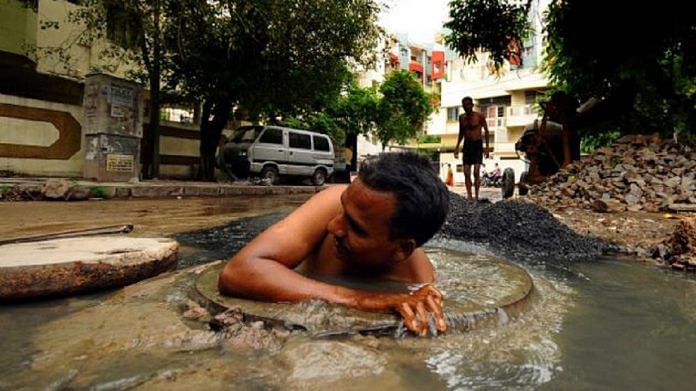If people are dying, someone has to go to jail.
This is what the Delhi High Court recently said while asking 10 local authorities to file affidavits stating whether or not they are employing manual scavengers, directly or indirectly through contractors, if they have procedures in place to supervise the contractors, and what steps they have taken to provide protective gear and safety kit to the manual scavengers, and for rehabilitation.
Replying to a question raised in Lok Sabha last week, Social Justice and Empowerment Minister of State Ramdas Athawale stated that in the last three years, a total of 88 sanitation workers had died while cleaning septic tanks and sewers, despite a ban on manual scavenging under the Prohibition of Employment as Manual Scavengers and their Rehabilitation Act 2013. While the Act says no one can employ a person for manual scavenging and lays down punishments for those who do, the minister said “there have been no reports from any state/Union Territory regarding conviction in such cases”. The rising deaths of sanitation workers and zero convictions only suggest that the Act is not being implemented.
Also read: Between Swachh Bharat & deaths – where is the sanitation policy for manual scavengers?
Under the Act, local authorities and the district magistrate have been conferred with powers and duties to implement the Act. In contrast, a 2014 report titled “Cleaning Human Waste: ‘Manual Scavenging,’ Caste, and Discrimination in India”, prepared by Human Rights Watch, had documented that manual scavenging persists with the collusion and support of local officials. The local authorities in different states not only fail to enforce relevant laws, but also themselves directly violate the law by employing manual scavengers. The failure on the part of the officials responsible for the implementation of the 2013 Act must invite fixing personal accountability on the officials and local authorities.
It is also seen that in a number of cases, the local bodies outsource cleaning/sanitation operations to private contractors in order to avoid accountability. In such cases, the authorities try to pass the onus on to contractors. For instance, in September 2018, the Delhi Jal Board, the state’s labour department and municipal authorities all refused to take responsibility for the deaths of five men while cleaning a sewage tank in an upmarket housing complex. Each state authority said that “it had no role in protecting private workers”.
Also read: Sewage worker deaths wouldn’t happen if India worked as hard on it as it did for polio
The practice of manual scavenging will not end in India if the officials and local authorities are allowed to abdicate their constitutional duty of ensuring a basic life of dignity to its citizens. Whether engagement of manual scavengers is done by private contractors or by negligent state officials, the state must be held accountable.
The jurisprudence created by the Supreme Court also supports this view. In the landmark case, People’s Union for Democratic Rights v. Union of India, while emphasising that social justice is the “signature tune” of the Indian Constitution, the Supreme Court had held that the state cannot abdicate its responsibility of ensuring observance of fundamental rights by private parties. Justice P.N. Bhagwati held: “[It] is the constitutional obligation of the State to take the necessary steps for the purpose of interdicting violation [of fundamental rights under Articles 17, 23 and 24] and ensuring observance of the fundamental right by the private individual who is transgressing the same”.
It was further held: “[The State cannot be absolved from its constitution obligation] to see that there is no violation of the fundamental right of [a] person, particularly when he belongs to the weaker section of humanity and is unable to wage a legal battle against a strong and powerful opponent who is exploiting him.”
Also read: The ‘c’ in Swachh Bharat is caste and Modi needs to address it
It is in this background that the observation of the Delhi High Court must be welcomed.
It is expected from the Delhi High Court that it will fix liability on local authorities, like Delhi Jal Board, New Delhi Municipal Corporation and Municipal Corporation of Delhi, if they have failed in eradicating manual scavenging, preventing deaths of our sanitation workers and controlling private contractors.
The deaths of sanitation workers reflect the failure of the government at every level to implement laws. The lives of individuals from disadvantaged castes, forcibly engaged in manual scavenging, cannot be a subject of the apathy of the authorities. It is high time that we place an absolute onus on these authorities, who have been negligent in fulfilling their constitutional and statutory duties.
The author is LLM 2019 postgraduate from Harvard Law School. Views are personal.



